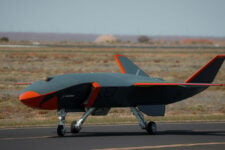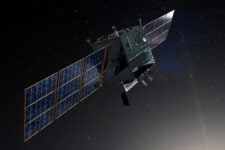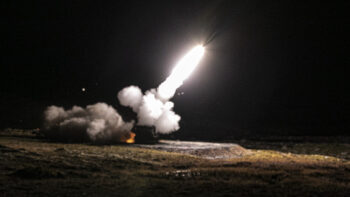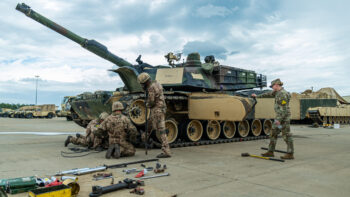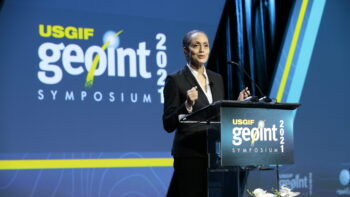
Col. Rich Kniseley, head of Space Systems Command’s Commercial Space Office. (US Air Force photo by Cherie Cullen)
WASHINGTON — The Space Force’s draft framework for how commercial satellite services could be called up in times of crisis or conflict to support military missions would allow the Defense Department to deny participating companies the right to sell their wares to any other client in times of “war, major conflict, national or international emergency.”
The “Commercial Augmentation Space Reserve,” or “CASR,” concept, under development by Space Systems Command’s recently revamped Commercial Space Office (COMSO), was released Monday for industry comment. The language is aimed at fleshing out a space parallel to the existing Air Force and Navy civil reserve fleets that allow those services to call up non-military planes and ships in times of need. COMSO’s first director, Col. Rich Kniseley, led the command’s task force that drafted the “pre-decisional” framework document.
The draft explains that under CASR, “commercial companies retain their civil status” while SPACECOM “exercises mission control via its Space Force service component.”
The draft framework sets up three levels of CASR participation based on the “spectrum of conflict” at any one time:
- Level 1 for day-to-day operations during peacetime that would involve a “minimum level” of commitment for services to DoD;
- Level 2 for “regional conflict or significant crisis” as defined by the Defense Department, combatant commands, military services or other US government departments/agencies; and,
- Level 3, “triggered by war, major conflict, national or international emergency” as determined by the president or secretary of defense. It adds that once Level 3 is approved, US Space Command is its “activation authority,” and that other combatant commands can request Level 3 activation of SPACECOM in crisis or conflict situations as well.
In exchange, the framework document suggests incentives for industry participants such as giving them status as a “preferential provider” to US government contracts, and “war-risk insurance” — although the request for information (RFI) acknowledges the latter would require more “robust analysis” to justify congressional approval.
However, the draft concludes that “Indemnification … is likely not appropriate in this context” — something that may disappoint some industry representatives who had hoped that the government would be willing to cover losses caused by adversary attack.
The RFI in particular asks industry to comment on the proposals for the various levels, “including contract actions to surge capacity during level 2 and potential denial of service to non-US Government approved entities during level 3.”
Industry is likely to be nervous about the proposed language, and among the questions vendors are likely to ask is whether participation requires a commitment to all three levels or whether signatories can pick and choose. For example, a DoD lockdown on sales to other clients, such as commercial users or foreign governments, could put some commercial space providers in breach of existing contracts and/or cause serious income loss. And while the draft CASR framework says the plan is to open the program to US companies and cleared subsidiaries of foreign firms, it acknowledges that the latter group in particular may prove tricky to rope in.
“Space Industry partners are heavily commercial, and some are subsidiaries held by foreign companies,” the draft says.
And the question of foreign ownership is particularly acute for commercial satellite communications (COMSATCOM) firms.
DoD and the Department of the Air Force (which overseas Space Force acquisition) acquire “a significant percentage of COMSATCOM support from US subsidiaries of foreign-based parent corporations,” and satellites “could be registered and licensed in other nations,” the draft explains. This “creates risk that support may not be available during conflict,” the draft says, noting that “contractual performance obligations alone may not be sufficient — foreign parents may terminate support based on government pressure and/or adversary coercion. States of satellite registry or licensing may likewise prohibit support.”
The COMSO draft also lays out nine “framework” elements for future work to fully develop, ranging from concepts of operations and decision-authority guidelines to “policy, regulatory and legal” to contractual to Pentagon budget implications. Each of these elements, the draft framework notes, would need to be tailored to suit the various Space Force missions relying in part of commercial capabilities — which currently are envisioned to include COMSATCOM, and intelligence, surveillance and reconnaissance.
COMSO has invited interested industry to sign up for in-person briefings Aug. 1 and 2 at its new(ish) headquarters in Chantilly, although the meetings are not open to the public. The deadline for formal responses to the RFI is Aug. 11 at 7pm Eastern time.
‘Changes’ expected in ISR satellite operations to sort NGA, Space Force roles: White House official
“In the end, what we’re really going to have to figure out here is: what needs to change? Is it policies? Is it authorities? Is it processes? Is it funding? Is it purely just advocacy and communication?” said National Space Council Director Chirag Parikh.



